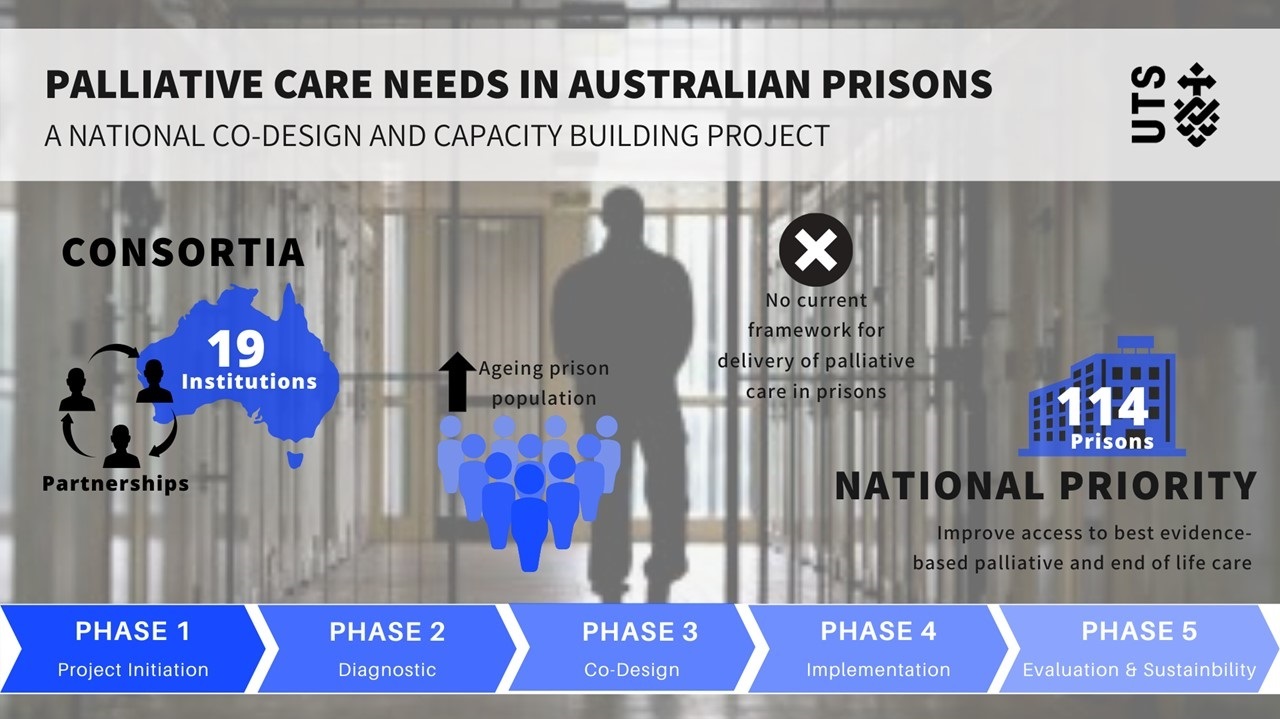National Palliative Care in Prison (PiP) Project
A blog post written by Professor Jane Phillips, Director and Kim Offner, Project Manager at Improving Palliative, Aged and Chronic Care through Clinical Research and Translation (IMPACCT), Faculty of Health, University of Technology Sydney
The numbers of older people in prison is increasing, reflective of a trend in historical offence sentencing and societal reluctance for compassionate release. This, compounded by the global burden of chronic illness, has driven a need for the delivery of palliative care in prisons. The National Palliative Care in Prison Project aims to address this need by partnering with justice and correctional health services to co-design a national palliative care framework for Australian prisons. Our project supports and aligns with the 2018 National Palliative Care Strategy.
The Consortia configured for this project includes; correctional health care service providers from each state and territory, experts and academics from several universities and representatives of peak health organisations. Over the next 3 years the Consortia led by Professor Jane Phillips plans to:
- map the palliative care needs of prisoners and correctional health services (planning in progress and ethics being sought);
- identify the barriers and enablers of providing best evidence-based palliative care to people in prison; and
- co-design a new national framework of palliative care for Australian prisons, inclusive of national policies, workforce capacity-building strategies, a clinical service model of care, and a toolkit of resources, for ongoing use (refer to Figure 1).

Figure 1: Overview of the Palliative Care in Prison Project
Aboriginal and Torres Strait Islander Community consultation underpins and guides all of the PiP Project work. An Aboriginal and Torres Strait Islander Community Engagement Strategy “Wambinya” (meaning ‘the act of caring’ in the Wiradjuri language) has been developed by the Chair of the Engagement Strategy Working Group, Associate Professor Megan Williams in consultation with Aboriginal and Torres Strait Islander health workers and community. Under the guidance of Wambinya, it is envisaged that a holistic, culturally sensitive, and compassionate framework and model of palliative care will be formulated to improve the end-of-life care for all Australian prisoners.
Currently, there is no standardised national model of palliative care for Australian prisons and very limited information about the capacity of correctional/justice health services to provide palliative and end-of-life care. The PiP Project is timely and important research that aims to improve the access to and quality of, palliative care service delivery to an under-served and vulnerable population.
For more information: email the Palliative Care in Prison Project Team PalCarePrisons@uts.edu.au and visit our website.

Jane Phillips, Professor Palliative Nursing, Director, Improving Palliative, Aged and Chronic Care through Clinical Research and Translation (IMPACCT), Faculty of Health, University of Technology Sydney

Kim Offner, Project Manager - Palliative Care in Prisons Project, Improving Palliative, Aged and Chronic Care through Clinical Research and Translation (IMPACCT), Faculty of Health, University of Technology Sydney